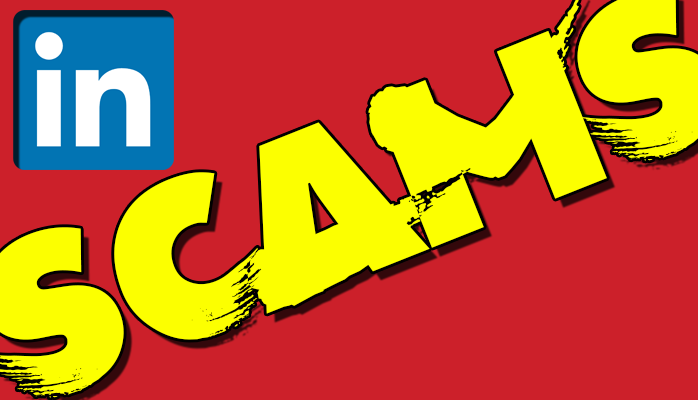
SCARS Institute’s Encyclopedia of Scams™ Published Continuously for 25 Years

Online scams are Nothing New!
We have been dealing with scammers since the Nigerian discovered email!
Reprinted from LinkedIn
However, the scammer community, particularly that of Western Africa has discovered LinkedIn in a big way.
A little background first.
As the creator of what may have been the first dating site back in ’95, I have watched that world with interest for 20 years, and see how overwhelmed online dating is with fake profiles and rampant scams. Some estimate that as much as US$800,000,000.00 per year flows into the Nigerian economy from scamming alone. There may be another $500,000.000.00 into the rest of Western Africa. I am also the publisher of one of the top-three Anti-Scammer websites (RomanceScamsNow.com), which I began some years ago after a close friend lost over $20,000.00 to a Ghanaian scammer. I, and my staff have been watching this problem for many years evolve and explode.
In a recent survey conducted by our site of 30,000 of our site visitors, the overwhelming attitude is that online dating is flooded with scammers and no longer works. A message that has been born out in the most recent lawsuit against a principal online dating site, accused of allowing scamming to proliferate, since their business model is based on being able to justify fees based upon the total number of active profiles. This is the common model throughout the online dating business. Unfortunately, it appears that in that world self-policing has failed to both protect the businesses and their customers.
Scamming Moves To Social Media
It should come as no surprise that as the scammers grew more sophisticated that they moved into Facebook and Google+ in a big way. Some claim that as many as 20% of Facebook accounts are fake. While I think that number is lower, I agree that almost every Facebook user has encountered a scammer or fraudster, and usually on a regular basis.
In the case of both Facebook and Google+ the modus operandi is is for the scammer to create a profile, populate it with a couple of photos (single digit number to be sure), and start harvesting victims by friending or following people with large contacts. This is not only a method for trolling for victims, but it is also a means for them to impersonate one or more of those victims, since the scammer needs “identities” to operate. This is why it is so critical to have your privacy settings to lock down you details and especially your photos – scammer burn through a HUGE number of photos – an average scammer scam use over 1,000 impersonations in just 6 months. In the meantime, the victims face is identified as a “Scammer” across the world. In women, it is mostly Adult Stars and Models who’s photos are stolen, and in men the current trend is US & European Military stolen from social media.
Now We Come to LinkedIn
Over the past two years, the scammers have been testing the waters here in LinkedIn, with the result that they are making an aggressive push forward.
Currently, scammers on LinkedIn run the gamut, from traditional Nigerians, Ghanaians, and other West Africans, to Asians and Russians. Each type has their particular business model, and each has their conversion percentages. However, in almost all cases the fake profiles share similarities that you should be on guard for. Remember, they may not be after you, but they are definitely after your contact list!
Scammers on Linked exhibit similar characteristics to those on other social media sites:
- Recent profile creation
- Few contacts initially
- Little, and inconsistent history
- No recommendations
- Little or no participation in groups
- Odd language use (for the place the person comes from)
- Web links that are broken or see out of place
- Gmail or Yahoo email addresses (assuming you can see them)
- Scammers on LinkedIn take full advantage of the messaging system, unlike other forms where they try to get you off of the source site and onto gmail or yahoo mail.
In a recent case, I received an Inmail from a Dubai venture capitalist, asking if I was looking for seed money. He has a profile that looked “odd” in that this was a person in his 60’s yet only had 10 years of work experience in his profile. He also had inconsistent education history.
After doing a Google image search and using TinEye.com (the two most powerful ways to verify a scam is to use their photos against them, that and their emails); I discovered the photo was of a UAE Defence Minister. I contacted the US Embassy for the country the scammer said he was based in, and confirmed that is was a real business, but that the profile name had no relationship with it. The profile was reported to LinkedIn, and to their credit they removed it. They story had a happy ending, in that the UAE did track down this scammer, and now awaits trial for impersonating a minister of their country. However, this is a rare event.
In that case, the scammer was on a phishing expedition to obtain business financial information that could be used for creating credit accounts and other purposes, including personal identity theft. Just think about the information in your profile, and how that might be used to impersonate your identity.
LinkedIn, like Facebook, does have protections of a sort. Your greatest protection is to not “play the game” the scammer wants you to.
The following things are safeguards you should be using now!
- Keep your contacts private
- Keep critical details out of your profile if you can
- Never blindly accept connection requests – make sure you know the person, or their context, and confirm it with a message before accepting them – besides it is polite to say hi before connecting!
- Look at a person’s profile for clues about their real identity
- Never give endorsements to people you don’t actually know – this is how scammers build their profiles
- If you send a message, look carefully at the reply – did they respond to what you send originally – in other words answer your questions, or just send a generic reply
The common types of LinkedIn Scams running are:
- Personal information phishing scams
they way your personal information so someone can steal your identity - Business information phishing scams
they want your business information so they can buy products or services in your business name - Catfishing scams
they want to develop a personal relationship which will let them ask for money – a helping hand - Blackmail Scams
engage you in any discussion and harvest information that can be embarrassing to you – personally or professionally - 419 Advance Fee Frauds
usual they have A MILLION DOLLARS and they need you to pay a small fee to have it sent to you – the new variation on this is application fees for business loan - Fake Check Scams
they want to buy something from you and send you a check (fake of course), but by the time you discover it, they have your products
Scammers are clever but also dumb. They are smart and adapt, so always be on your guard. However, they are running a large scale business – a game of numbers – and do not have time for all the details usually, meaning they make mistakes – watch for those!
The best advice I can give you, having been on LinkedIn now almost 15 years, is clean out your contacts from time to time. If you don’t know them, or at least the company or profession, get rid of them. This is not a game where the biggest list wins! It is the quality of your list that matters in my humble opinion.
If you find a scammer, please drop me a message. It is up to each of us to make sure the bad guys don’t win wherever they are! If you have been a victim, I might be able to help.
Kudos to LinkedIn for being the most responsive social media on this topic!!!
Cheers,
Dr. Tim
Web Publisher, Content Guru
& Big-Game Scammer Hunter
-/ 30 /-
What do you think about this?
Please share your thoughts in a comment below!
Table of Contents
LEAVE A COMMENT?
Thank you for your comment. You may receive an email to follow up. We never share your data with marketers.
Recent Comments
On Other Articles
- on Love Bombing And How Romance Scam Victims Are Forced To Feel: “I was love bombed to the point that I would do just about anything for the scammer(s). I was told…” Feb 11, 14:24
- on Dani Daniels (Kira Lee Orsag): Another Scammer’s Favorite: “You provide a valuable service! I wish more people knew about it!” Feb 10, 15:05
- on Danielle Delaunay/Danielle Genevieve – Stolen Identity/Stolen Photos – Impersonation Victim UPDATED 2024: “We highly recommend that you simply turn away form the scam and scammers, and focus on the development of a…” Feb 4, 19:47
- on The Art Of Deception: The Fundamental Principals Of Successful Deceptions – 2024: “I experienced many of the deceptive tactics that romance scammers use. I was told various stories of hardship and why…” Feb 4, 15:27
- on Danielle Delaunay/Danielle Genevieve – Stolen Identity/Stolen Photos – Impersonation Victim UPDATED 2024: “Yes, I’m in that exact situation also. “Danielle” has seriously scammed me for 3 years now. “She” (he) doesn’t know…” Feb 4, 14:58
- on An Essay on Justice and Money Recovery – 2026: “you are so right I accidentally clicked on online justice I signed an agreement for 12k upfront but cd only…” Feb 3, 08:16
- on The SCARS Institute Top 50 Celebrity Impersonation Scams – 2025: “Quora has had visits from scammers pretending to be Keanu Reeves and Paul McCartney in 2025 and 2026.” Jan 27, 17:45
- on Scam Victims Should Limit Their Exposure To Scam News & Scammer Photos: “I used to look at scammers photos all the time; however, I don’t feel the need to do it anymore.…” Jan 26, 23:19
- on After A Scam, No One Can Tell You How You Will React: “This article was very informative, my scams happened 5 years ago; however, l do remember several of those emotions and/or…” Jan 23, 17:17
- on Situational Awareness and How Trauma Makes Scam Victims Less Safe – 2024: “I need to be more observant and I am practicing situational awareness. I’m saving this article to remind me of…” Jan 21, 22:55
ARTICLE META
Important Information for New Scam Victims
- Please visit www.ScamVictimsSupport.org – a SCARS Website for New Scam Victims & Sextortion Victims
- Enroll in FREE SCARS Scam Survivor’s School now at www.SCARSeducation.org
- Please visit www.ScamPsychology.org – to more fully understand the psychological concepts involved in scams and scam victim recovery
If you are looking for local trauma counselors please visit counseling.AgainstScams.org or join SCARS for our counseling/therapy benefit: membership.AgainstScams.org
If you need to speak with someone now, you can dial 988 or find phone numbers for crisis hotlines all around the world here: www.opencounseling.com/suicide-hotlines
A Note About Labeling!
We often use the term ‘scam victim’ in our articles, but this is a convenience to help those searching for information in search engines like Google. It is just a convenience and has no deeper meaning. If you have come through such an experience, YOU are a Survivor! It was not your fault. You are not alone! Axios!
A Question of Trust
At the SCARS Institute, we invite you to do your own research on the topics we speak about and publish, Our team investigates the subject being discussed, especially when it comes to understanding the scam victims-survivors experience. You can do Google searches but in many cases, you will have to wade through scientific papers and studies. However, remember that biases and perspectives matter and influence the outcome. Regardless, we encourage you to explore these topics as thoroughly as you can for your own awareness.
Statement About Victim Blaming
SCARS Institute articles examine different aspects of the scam victim experience, as well as those who may have been secondary victims. This work focuses on understanding victimization through the science of victimology, including common psychological and behavioral responses. The purpose is to help victims and survivors understand why these crimes occurred, reduce shame and self-blame, strengthen recovery programs and victim opportunities, and lower the risk of future victimization.
At times, these discussions may sound uncomfortable, overwhelming, or may be mistaken for blame. They are not. Scam victims are never blamed. Our goal is to explain the mechanisms of deception and the human responses that scammers exploit, and the processes that occur after the scam ends, so victims can better understand what happened to them and why it felt convincing at the time, and what the path looks like going forward.
Articles that address the psychology, neurology, physiology, and other characteristics of scams and the victim experience recognize that all people share cognitive and emotional traits that can be manipulated under the right conditions. These characteristics are not flaws. They are normal human functions that criminals deliberately exploit. Victims typically have little awareness of these mechanisms while a scam is unfolding and a very limited ability to control them. Awareness often comes only after the harm has occurred.
By explaining these processes, these articles help victims make sense of their experiences, understand common post-scam reactions, and identify ways to protect themselves moving forward. This knowledge supports recovery by replacing confusion and self-blame with clarity, context, and self-compassion.
Additional educational material on these topics is available at ScamPsychology.org – ScamsNOW.com and other SCARS Institute websites.
Psychology Disclaimer:
All articles about psychology and the human brain on this website are for information & education only
The information provided in this article is intended for educational and self-help purposes only and should not be construed as a substitute for professional therapy or counseling.
While any self-help techniques outlined herein may be beneficial for scam victims seeking to recover from their experience and move towards recovery, it is important to consult with a qualified mental health professional before initiating any course of action. Each individual’s experience and needs are unique, and what works for one person may not be suitable for another.
Additionally, any approach may not be appropriate for individuals with certain pre-existing mental health conditions or trauma histories. It is advisable to seek guidance from a licensed therapist or counselor who can provide personalized support, guidance, and treatment tailored to your specific needs.
If you are experiencing significant distress or emotional difficulties related to a scam or other traumatic event, please consult your doctor or mental health provider for appropriate care and support.
Also read our SCARS Institute Statement about Professional Care for Scam Victims – click here to go to our ScamsNOW.com website.

















Michael A. Becker on linked in, his photo actually belongs to Dr. Ivan Young. This is a Nigerian scam artist.
Antonio Manetti – atmanetti@gmail.com is a scammer in Linkedin, makes ladies fall in love with him then asks them to send him money for his business. He is supposdly an engineer from Italy but has gotten contracts worth millions of dollars to work in Dubai UAE so he says he doesnt have enough money to cover expenses and thats when he asks the women who he has seduced to help him raise money and send it to him and promises to pay them back and to marry them.